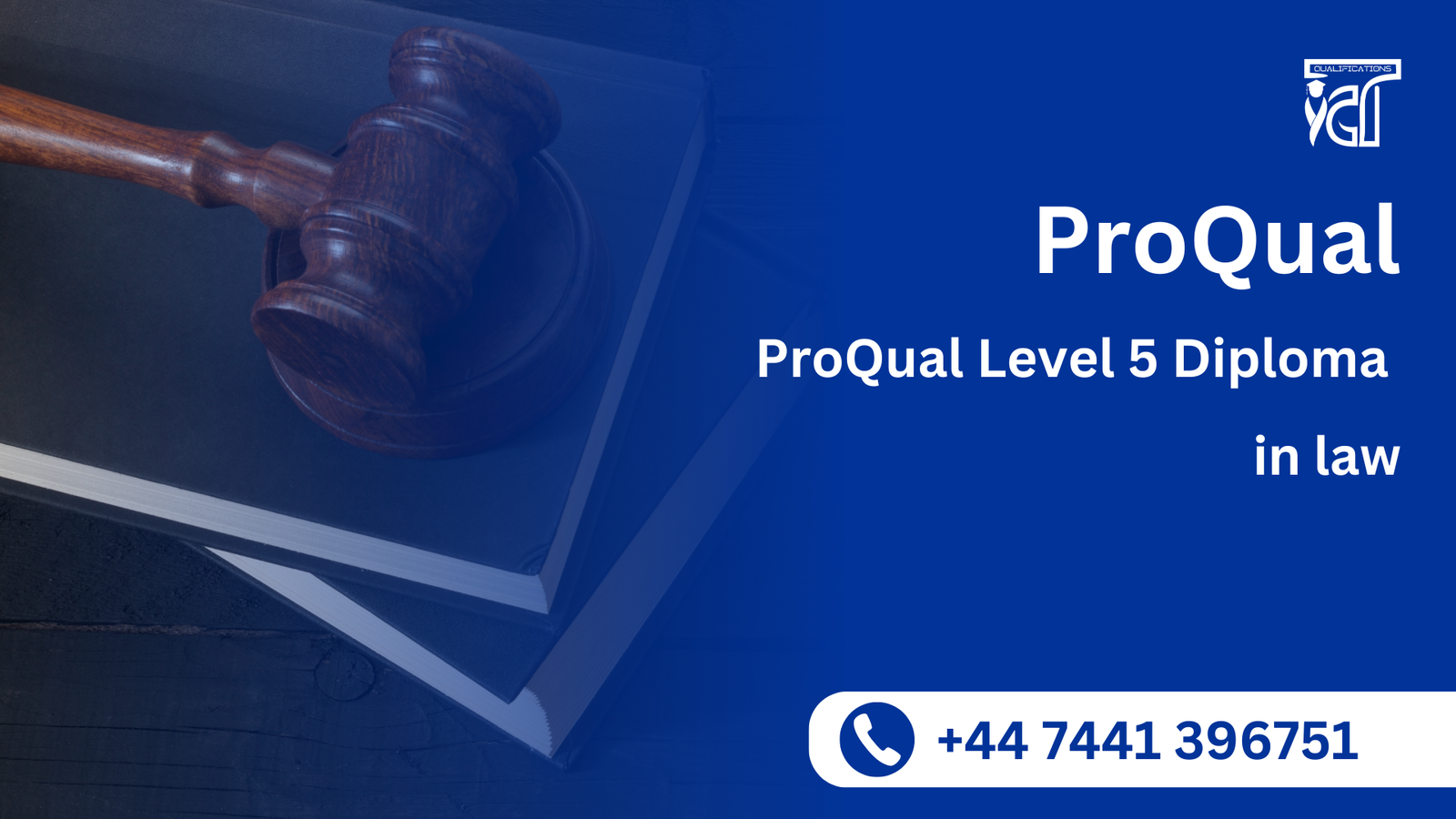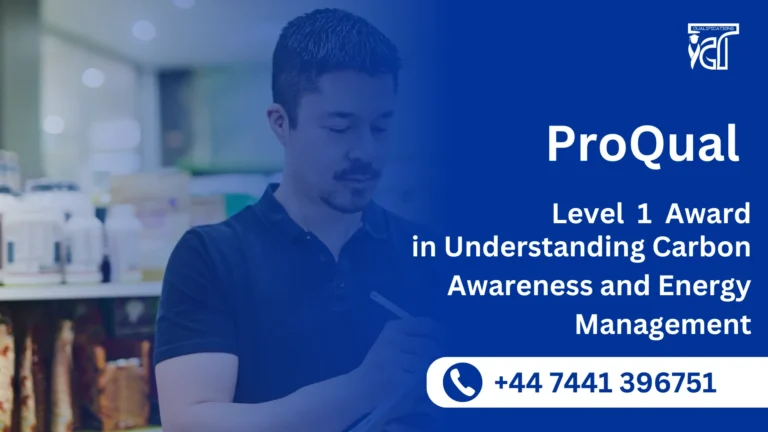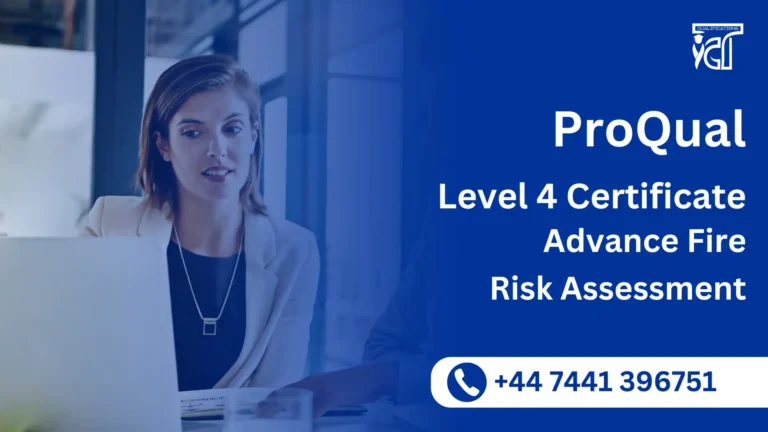In the ever-evolving legal landscape, acquiring a solid foundation in legal principles and practical skills is essential for anyone aspiring to pursue a career in law or related fields. The ProQual Level 4 and Level 5 Combined Diploma in Law offers a comprehensive qualification that combines theoretical knowledge with practical application, designed to prepare learners for diverse roles within the legal sector.
This combined diploma is Ofqual-regulated and internationally recognised, providing learners with a qualification equivalent to the first two years of undergraduate study. Its flexible, assignment-based assessment model makes it accessible to working professionals and students alike, enabling them to study at their own pace without the pressure of exams.
The ProQual Level 4 and Level 5 Combined Diploma in Law equips learners with a thorough understanding of key legal concepts, including criminal law, contract law, tort law, and constitutional law. The course also emphasizes legal research, analysis, and the development of critical thinking skills necessary for interpreting and applying legal principles.
Designed to bridge the gap between academic theory and practical skills, this diploma prepares students for both professional roles and further academic study. It serves as a solid foundation for those looking to pursue careers as legal assistants, paralegals, or to progress into higher legal education.
This combined diploma covers essential areas of law, focusing on the principles, applications, and ethical considerations within the legal system. The curriculum is structured to provide a clear understanding of the UK legal framework, while also offering insights into international law perspectives.
The ProQual Level 4 and Level 5 Combined Diploma in Law is a robust and flexible qualification designed to provide learners with the essential legal knowledge and skills required in today’s legal sector. Whether you are starting your legal education journey or seeking to enhance your professional credentials, this diploma offers a credible and recognised pathway to success.
Enroll today to take the first step toward a rewarding career in law.
ProQual Level 4 and Level 5 Combined Diploma in Law
The ProQual Level 5 Diploma in Law to achieve the qualification candidates must must complete the all mandatory units of Total Qualification Time (TQT): 2400 Hours, Guided Learning Hours (GLH): 1200 Hours and 240 credits:
| Sr# | Unit Title | credit | TQT | GLH |
|---|---|---|---|---|
| 1 | Contract Law | 20 | 200 | 100 |
| 2 | Tort Law | 20 | 200 | 100 |
| 3 | Criminal Law | 20 | 200 | 100 |
| 4 | Constitutional and Administrative Law | 20 | 200 | 100 |
| 5 | European Union Law | 20 | 200 | 100 |
| 6 | Family Law | 20 | 200 | 100 |
| 7 | Land Law | 20 | 200 | 100 |
| 8 | Company Law | 20 | 200 | 100 |
| 9 | Employment Law | 20 | 200 | 100 |
| 10 | Legal Research and Writing | 20 | 200 | 100 |
| 11 | Dispute Resolution and Alternative Dispute Resolution (ADR) | 20 | 200 | 100 |
| 12 | Property Law | 20 | 200 | 100 |
GLH (Guided Learning Hours) and TQT (Total Qualification Time) are terms commonly used in vocational qualifications to help define the amount of time a learner is expected to spend on their studies.
1. GLH (Guided Learning Hours)
GLH refers to the number of hours a learner spends being directly taught, supervised, or supported during their course. This includes the time spent in activities such as:
- Classroom instruction
- Practical workshops
- One-on-one tutoring or mentoring sessions
- Online learning sessions with tutor support
In other words, GLH represents the time that learners are actively engaged with their instructors or learning activities.
2. TQT (Total Qualification Time)
TQT represents the total amount of time a learner is expected to invest in completing a qualification, including:
- GLH (Guided Learning Hours): Time spent on direct learning, as explained above.
- Self-Directed Learning: This includes time spent on independent study, research, assignment completion, preparation for exams, and any other work the learner does outside of direct teaching hours.
TQT is a broader measure that includes all the time required to achieve the qualification. It helps learners and employers understand the overall commitment required for the qualification.
Key Differences Between GLH and TQT:
- GLH focuses on direct learning with guidance or supervision.
- TQT includes GLH as well as independent study time and other learning-related activities.
Example:
If a qualification has a TQT of 600 hours and a GLH of 250 hours, it means the learner should spend 250 hours in direct learning (classroom, online, or tutor-led sessions) and 350 hours on independent study or research.
ProQual Level 4 and Level 5 Combined Diploma in Law
Contract Law
- Understand the fundamental principles of contract law.
- Understand the formation and elements of a valid contract.
- Analyse the rights and obligations of parties under a contract.
- Examine the legal remedies for breach of contract.
- Assess the impact of statutory laws and regulations on contracts
Tort Law
- Understand the fundamental principles of tort law.
- Analyse the elements of negligence and liability.
- Evaluate the concept of intentional torts and defences.
- Examine the principles of strict liability and vicarious liability.
- Assess the remedies available in tort law
Criminal Law
- Understand the principles and sources of criminal law.
- Analyse the key elements of criminal liability.
- Examine specific offenses under criminal law.
- Evaluate defences to criminal liability.
- Assess the impact of criminal justice systems and procedures.
Constitutional and Administrative Law
- Understand the principles of constitutional and administrative law
- Analyse the structure and function of government institutions
- Examine the separation of powers and checks and balances in constitutional law
- Evaluate the role of judicial review in administrative law.
- Assess the role of rights and freedoms in constitutional law.
European Union Law
- Understand the structure and principles of European Union law.
- Analyse the sources and authority of European Union law.
- Examine the key legal institutions within the European Union.
- Evaluate the impact of European Union law on member states and individuals.
- Assess the role of European Union law in international trade and relations.
Family Law
- Understand the principles and sources of family law.
- Analyse the legal aspects of marriage and civil partnerships.
- Examine the legal consequences of divorce and separation.
- Evaluate the protection of children under family law.
- Assess the rights and obligations in matters of child custody and support.
Property Law
- Understand the principles and sources of property law.
- Analyse the different types of property and ownership rights.
- Examine the legal processes involved in the transfer of property.
- Evaluate the protection of property rights under law.
- Assess the impact of leases and tenancy agreements on property law.
Land Law
- Understand the principles and sources of land law.
- Analyse the rights and responsibilities of landowners.
- Examine the legal processes of land transfer and conveyancing.
- Evaluate the impact of land use and zoning laws.
- Assess the legal protection of land interests, including mortgages and easements.
Company Law
- Understand the principles and sources of company law
- Analyse the formation and structure of companies.
- Examine the rights and duties of company directors and shareholders.
- Evaluate the legal issues surrounding mergers, acquisitions, and corporate governance.
- Assess the impact of company law on corporate liability and insolvency.
Employment Law
- 1 Understand the principles and sources of employment law.
- Analyse the employment relationship and its legal elements.
- Examine the rights and duties of employees and employers.
- Evaluate the legal aspects of workplace disputes and grievance resolution.
- Assess the role of employment law in protecting workers’ rights.
Legal Research and Writing
- Understand the principles of legal research and writing.
- Analyse the legal research process and methodologies.
- Examine the techniques for effective legal writing.
- Evaluate the importance of case law and legal precedent in legal writing.
- Assess the impact of legal research in practice.
Dispute Resolution and Alternative Dispute Resolution (ADR)
- Understand the principles of dispute resolution and ADR.
- Analyse the different types of ADR mechanisms.
- Examine the advantages and disadvantages of ADR.
- Evaluate the legal framework for ADR in the legal system.
- Assess the role of ADR in resolving commercial and family disputes.
Benefits – ProQual Level 4 and Level 5 Combined Diploma in Law
- Ofqual-Regulated and Internationally Recognised
This qualification is officially regulated by Ofqual and widely accepted by employers and academic institutions globally, ensuring high credibility. - Comprehensive Legal Knowledge
Covers essential areas of law including criminal, contract, tort, constitutional, and employment law, providing a solid foundation in legal principles. - Equivalent to Two Years of Undergraduate Study
Offers 240 credits, providing learners with an academic level comparable to the first two years of a law degree. - Flexible, Assignment-Based Assessment
Allows learners to complete coursework at their own pace without the stress of exams, ideal for working professionals and students. - Develops Practical Legal Skills
Enhances abilities in legal research, critical analysis, case evaluation, and professional legal communication. - Prepares for Various Legal Careers
Suitable for those aiming to become paralegals, legal assistants, compliance officers, or to progress into further legal education. - Supports Academic Progression
Provides a pathway to Level 6 legal qualifications, undergraduate law degrees (LLB), and professional certifications. - Enhances Critical Thinking and Problem-Solving
Equips learners to analyze complex legal issues and apply ethical considerations effectively. - Accessible to a Wide Range of Learners
Designed for newcomers to law, career changers, and those already working in legal environments seeking formal qualifications.
The ProQual Level 4 and Level 5 Combined Diploma in Law is ideal for:
- Aspiring Legal Professionals
Individuals looking to build a strong foundation in legal principles and develop practical skills for a career in law. - Current Legal Support Staff
Paralegals, legal assistants, and administrative staff aiming to formalize and enhance their qualifications. - Career Changers
Those seeking to transition into the legal sector from other industries, acquiring essential legal knowledge and skills. - Students Preparing for Higher Education
Learners who plan to progress to Level 6 legal qualifications or undergraduate law degrees (LLB). - Professionals Seeking Flexible Learning
Individuals who require an assignment-based, flexible course structure that accommodates work and personal commitments. - Compliance and Regulatory Professionals
Those working in compliance, risk management, or related fields who need a better understanding of legal frameworks.
This diploma suits anyone motivated to gain a recognised qualification that combines theoretical knowledge with practical application in law.
Entry Requirements
Register Now
Qualification Process
Qualification Process for the ProQual Level 4 and Level 5 Combined Diploma in Law
- Self-Assessment:
Begin by evaluating your eligibility to ensure you meet the qualification requirements, including work experience, knowledge, and language proficiency. - Registration:
Complete your registration by submitting the required documents, including a scanned copy of a valid ID, and paying the registration fee. - Induction:
An assessor will conduct an induction to confirm your eligibility for the course and explain the evidence requirements. If you do not meet the criteria, your registration will be canceled, and the fee will be refunded. - Assignmnets & Evidence Submission:
Provide all assignmnets and the necessary evidence based on the assessment criteria outlined in the course. If you are unsure of the required evidence, consult with the assessor for guidance on the type and nature of evidence needed. - Feedback and Revision:
The assessor will review your submitted evidence and provide feedback. Evidence that meets the criteria will be marked as “Criteria Met,” while any gaps will be identified. You will be asked to revise and resubmit if needed. - Competence Evidence:
Submit final evidence demonstrating that all learning outcomes have been met. This evidence will be marked as “Criteria Met” by the assessor once it is satisfactory. - Internal Quality Assurance (IQA):
The Internal Quality Assurance Verifier (IQA) will review your evidence to ensure consistency, quality, and compliance with standards. - External Verification:
The IQA will submit your portfolio to ProQual’s External Quality Assurance Verifiers (EQA) for final confirmation. The EQA may contact you directly to verify the authenticity of your evidence. - Certification:
Upon successful completion of all checks, ProQual will issue your official certificate, confirming that you have attained the ProQual Level 4 and Level 5 Combined Diploma in Law.







